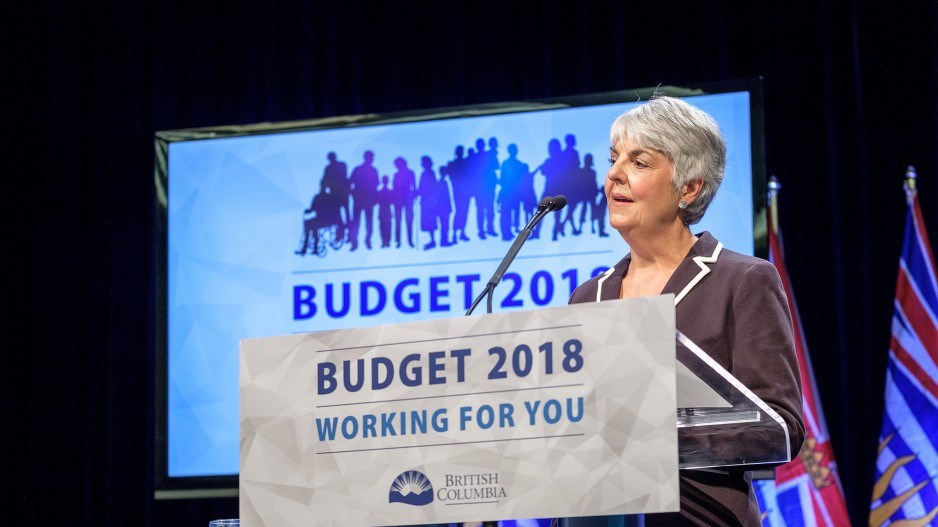Businesses in B.C. would be wise to start budgeting this year for new payroll taxes in 2019, and some should expect to pay double for one year, because they will be paying Medical Services Plan premiums and the new payroll tax.
Accounting departments at businesses throughout B.C. last week were still calculating exactly how much more their companies will pay in wages and taxes over the next couple of years.
The three-year fiscal plan unveiled last week by B.C. Finance Minister Carole James calls for massive new spending and balanced budgets. But it only accomplishes that balance through more than $5 billion worth of new taxes or tax hikes over three years.
Many businesses welcome the government’s $1 billion child-care plan because lack of access to affordable child care prevents many new parents, especially women, from returning to work.
But they were blindsided by the employer health tax, which will replace Medical Services Plan (MSP) premiums.
In total, the provincial government will raise $4.4 billion through new taxes or tax increases over the next three years. It also plans to raise $834 million in additional carbon tax revenue during that time. The carbon tax will rise to $35 from $30 per tonne this year and continue to increase by $5 per tonne annually until hitting $50 in 2021.
Of the $5 billion the government plans to raise in new taxes or tax increases, $4.2 billion will come from the new payroll tax, with the private sector paying the lion’s share: $3.4 billion. (The public sector pays approximately 20% of MSP premiums in B.C.)
The massive tax burden shift from employee to employer in B.C. will coincide with additional federal payroll taxes next year when the Canada Pension Plan payroll tax is scheduled to start increasing each year for five years.
Labour-intensive businesses, especially those that pay employees minimum wage, will be the hardest hit, because they face a double whammy: an 11% minimum-wage hike in June and a new 1% to 2% payroll tax at the beginning of 2019.
Businesses with payrolls of $500,000 or less are exempt from the new payroll tax. Businesses with payrolls of $1.5 million will pay $29,250 annually. A business with a payroll exceeding $1.5 million will pay $29,250, plus 1.95% on payroll exceeding $1.5 million.
Businesses that don’t cover their employees’ MSP premiums now will be the hardest hit, because they will be paying a new tax.
Employers who cover their employees’ MSP premiums will feel less of an impact, although even they will likely be paying more in 2019.
Hanif Karmally, vice-president and chief financial officer for lumber producer Teal-Jones Group, said his company covers MSP premiums for its workforce, which varies between 600 and 700.
Like many companies, he said Teal-Jones welcomes the provincial budget’s social spending, because it benefits employees. He added that other budget measures, such as higher carbon taxes and a 1% increase in corporate taxes, are “incidental.”
But he calculates that shifting the burden for MSP onto business will add $500,000 to $600,000 to his company’s costs for the first year, because it will be paying both MSP premiums and a new payroll tax at the highest rate.
The employer health tax comes into effect in 2019, but the MSP premiums won’t be fully phased out until 2020.
Once the MSP premiums are eliminated, the new payroll tax will still cost his company $200,000 a year more than what MSP premiums cost.
“The employer health tax, at 1.95% of payroll, is much larger than the reduction in MSP premiums from an employer’s perspective,” Karmally said.
According to Liberal MLAs commenting on the budget last week, KF Aerospace in Kelowna, which has 750 employees, will face an additional $1 million annually in payroll tax, while Delta’s Ocean Trailer, with an annual payroll of $3 million to $4 million, will pay $125,000.
For employees who pay their own MSP premiums, having them eliminated will be like getting a raise. But that might be the only raise they get in 2019, because employers who now have to pay the payroll tax might be unable to afford to give them a cost-of-living bump.
Aaron Kuzik, a partner at Rolfe Benson LLP chartered accountants, points out the 2% payroll tax is equal to a typical cost-of-living increase.
“It really starts to add up and employers maybe start to think, ‘Can we afford to give our employees a raise?’ So, in one sense an employee, they don’t have to pay MSP premiums, but on the other hand maybe their raises aren’t going to be as healthy.
“By itself it’s not significant. It’s just that the compounding – the cost of doing business – is just getting more expensive in B.C.”
Richard Truscott, vice-president, B.C. and Alberta, for the Canadian Federation of Independent Business (CFIB), estimates that 4,000 of the CFIB’s B.C. members will end up paying the new payroll tax.
“For those businesses that weren’t able to afford to pay the MSP premiums for their employees and are now facing a brand new payroll tax, they’re going to see a big jump in their costs,” he said.
The new tax will come on top of a range of other tax measures that were introduced in the September 2017 mini-budget, or since then, including:
•a 1% corporate tax increase;
•an 11% minimum-wage increase that goes into effect June 1; and
•a 16.7% increase in carbon taxes in 2018.
The one bit of tax relief for business is the elimination of PST on electricity. The tax was reduced to 3.5% from 7% at the beginning of the year. It is scheduled to be eliminated entirely in April 2019.
For energy-intensive industries like mining, it is a significant tax reduction.
Bryan Cox, president of the Mining Association of BC, said the full elimination of the PST on power amounts to roughly $1 million for a typical metal mine.




